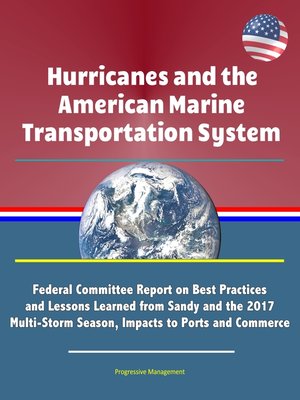Hurricanes and the American Marine Transportation System
ebook ∣ Federal Committee Report on Best Practices and Lessons Learned from Sandy and the 2017 Multi-Storm Season, Impacts to Ports and Commerce

Sign up to save your library
With an OverDrive account, you can save your favorite libraries for at-a-glance information about availability. Find out more about OverDrive accounts.
Find this title in Libby, the library reading app by OverDrive.



Search for a digital library with this title
Title found at these libraries:
| Library Name | Distance |
|---|---|
| Loading... |
This unique report issued in December 2018 has been professionally converted for accurate flowing-text e-book format reproduction. The Marine Transportation System (MTS) plays a critical role in United States commerce and security, facilitating the movement of over two billion tons of goods annually. This critical function is often at risk as the MTS is susceptible to the impacts of weather and climate hazards, such as hurricanes. The 2017 hurricane season was a record year for the U.S. and its territories with four of six major hurricanes making landfall in the U.S. and impacting coastal communities and the infrastructure they rely upon. Three of these hurricanes received most of the attention for their major impacts across the Gulf Coast, Florida, and the Caribbean territories: Harvey, Irma, and Maria. Each of these hurricanes was unique and required MTS stakeholders to adjust response and recovery operations to better serve communities in need. Since these adjustments were often made ad-hoc and after the major response and recovery phases were over, there is a great need to review performance, identify best practices, and ensure that the MTS agencies, owners, and operators utilize this new information to be better prepared for future storms. The purpose of this report to describe and understand the impacts, challenges, and successes of the 2017 storm season from the perspective of multiple Federal agencies that manage and operate the MTS. To accomplish this, the report reviews each storm in chronological order, identifying the impacts, challenges, and successes of each. The second objective of the report is to review this information to identify key trends that were common across all major hurricanes during the 2017 hurricane season and identify best practices and opportunities for improving resilience. The final purpose of this report is to utilize the four-step resilience framework to identify recommendations for increasing the ability of the MTS to prepare, resist, recover, and adapt to and from future storms.
This compilation includes a reproduction of the 2019 Worldwide Threat Assessment of the U.S. Intelligence Community.
Much has been learned from past hurricanes like Katrina and Sandy as to how to enhance the coordination of federal and non-federal stakeholders and partners increase the resilience and rapid recovery of the MTS to hurricanes. This report describes the importance of the MTS to impacted regions, and for each hurricane, identifies the unique impact factors, the major challenges, pre-storm actions, and successes encountered throughout the response and recovery effort. Using this information, the report aggregates existing best practices for response and recovery, identifies several opportunities to enhance response and recovery actions, and conducts an exercise to identify and recommend the most feasible and impactful actions that can be undertaken to increase the ability of the MTS to prepare, respond/recover, and adapt to future storms.







